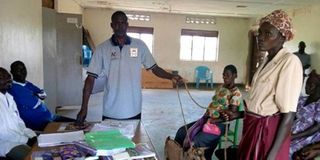Dokolo revives LC courts to resolve family conflicts

Speaking out. A community court in session at Dokolo Sub-county headquarters last Thursday. PHOTO BY JALIRA NAMYALO
What you need to know:
- A court, which comprises five members from each parish in the sub-county, sits twice a week and registers complaints at Shs20,000, which people say is a fair price.
- The AGHA programme officer policy and advocacy, Ms Asumpta Nangonzi, says Dokolo is a post conflict community, with GBV being a major challenge there.
Dokolo. Dokolo District has revived Local Council III courts in a bid to resolve gender based violence (GBV) and simple land conflicts which affect development in the country.
District local leaders argue that formal courts take a lot of time to handle GBV and land cases, most of which require large sums of money.
The Dokolo Sub-county senior assistant secretary, Mr Denis Ochero, explains that people fear lodging their cases with formal courts because of the huge costs and bureaucratic procedures involved.
“There is a negative perception among people about formal courts in respect to corruption. Locals think that one has to bribe his or her way to win a case. Gender based violence was increasing at a high rate, which prompted us to revive and strengthen local council courts for our people to find means of redress,” Mr Ochero says.
He says the public response to the LC courts has been positive, adding that they are working with Action Group for Health, Human Rights and HIV/Aids (AGHA), an NGO which has provided both technical and financial support.
“Although AGHA has guided us in capacity building of LCIII courts, we still need more support from government to put a proper mechanism to support and popularise these courts to reduce on the backlog in the main courts. Support from partners and leaders is also needed to empower and support functionality of theses courts,” Mr Ochero says.
The sub county court chairman, Mr Francis Okure, says they register between two to three cases a week, which are disposed of within two weeks and a month if witnesses are stubborn or out of the district.
“Since we started this February with support from AGHA, we have disposed 25 cases in the first quarter where one was referred to the magistrate court and another to Police. We mostly give punishments of compensation, community work and compelling people to pay back in case of disputes for dowry, damage of crops and slashing in cases of being idle and disorderly,” Mr Okure says.
A court, which comprises five members from each parish in the sub-county, sits twice a week and registers complaints at Shs20,000, which people say is a fair price.
Mr Okure explains that sensitisation through radio talk shows and drama has helped reduce GBV cases in their community.
The AGHA programme officer policy and advocacy, Ms Asumpta Nangonzi, says Dokolo is a post conflict community, with GBV being a major challenge there.
“We realised that such areas need increased awareness about the dangers of GBV and how to prevent and resolve such conflicts. Through drama, radio talk show, we reach information to victims and the community in general,” Ms Nangozi explains.
She argues that government should provide budgets for LCIII courts to be able to address the conflicts.



